|
|
|
Sort Order |
|
|
|
Items / Page
|
|
|
|
|
|
|
| Srl | Item |
| 1 |
ID:
086511
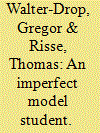

|
|
|
|
|
| Publication |
2009.
|
| Summary/Abstract |
Twenty years after the fall of the Iron Curtain, it is time to take stock. Have expectations been fulfilled? Not entirely. There are three areas where Europe has clearly lagged: bridging the continent's divisions; establishing a veritable common foreign policy; and fostering a sense of legitimacy for the project of European integration.
|
|
|
|
|
|
|
|
|
|
|
|
|
|
|
|
| 2 |
ID:
057796


|
|
|
| 3 |
ID:
178549
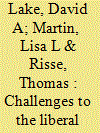

|
|
|
|
|
| Summary/Abstract |
As International Organization commemorates its seventy-fifth anniversary, the Liberal International Order (LIO) that authors in this journal have long analyzed is under challenge, perhaps as never before. The articles in this issue explore the nature of these challenges by examining how the Westphalian order and the LIO have co-constituted one another over time; how both political and economic dynamics internal to the LIO threaten its core aspects; and how external threats combine with these internal dynamics to render the LIO more fragile than ever before. This introduction begins by defining and clarifying what is “liberal,” “international,” and “orderly” about the LIO. It then discusses some central challenges to the LIO, illustrated by the contributors to this issue as well as other sources. Finally, we reflect on the analytical lessons we have learned—or should learn—as the study of the LIO, represented by scholarship in International Organization, has sometimes overlooked or marginalized dynamics that now appear central to the functioning, and dysfunction, of the order itself.
|
|
|
|
|
|
|
|
|
|
|
|
|
|
|
|
| 4 |
ID:
011883
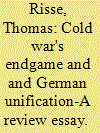

|
|
|
|
|
| Publication |
Spring 1997.
|
| Description |
159-185
|
|
|
|
|
|
|
|
|
|
|
|
|
|
|
|
| 5 |
ID:
106346
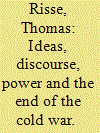

|
|
|
|
|
| Publication |
2011.
|
| Summary/Abstract |
Reagan's rhetoric and actions in the arms race triggered considerable opposition, which was necessary to establish a counter-discourse in particular through the peace movements in the West, which then impacted upon the discussions in Moscow. It enabled Gorbachev to overcome his considerable domestic opposition and to make the necessary concessions, which started to bring the cold war to an end. In this sense, the peace movements won the cold war, too. The end of the cold war was as much a discursive struggle over ideas about international order and the right mix of deterrence and détente as the East-West conflict itself. It is a matter of good fortune that the cold war had a relatively happy ending and that Europe was reunited. Claiming victory for one side or the other seems to be beside the point, even 20 years later.
|
|
|
|
|
|
|
|
|
|
|
|
|
|
|
|
| 6 |
ID:
158455


|
|
|
|
|
| Summary/Abstract |
Limited statehood is frequently depicted as a major cause for civil war and violent conflict. Consequently, state-building efforts are often considered to be an effective tool for the prevention of civil war and violent conflict. This essay argues, however, that this assumption is misguided in several respects. First, at present and historically, areas of limited statehood are the global default rather than the exception. Thus, efforts to eliminate limited statehood would likely be unsuccessful. Second, limited statehood does not equal civil war and violence. In fact, only a small fraction of areas of limited statehood are affected by civil war. Third, a too-narrow focus on state-building may be counterproductive, as it may foster ineffective or even predatory state institutions. Such a focus also ignores the plurality of governance actors beyond the state that are relevant for effective governance–such as service provision and rule-making–in areas of limited statehood. Therefore, external actors like international organizations and foreign powers should contribute to governance-building rather than state-building, with a focus on service provision and rule-making institutions with a broader scope than the state.
|
|
|
|
|
|
|
|
|
|
|
|
|
|
|
|
| 7 |
ID:
048048
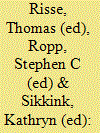

|
|
|
|
|
| Publication |
Cambridge, Cambridge University Press, 2000.
|
| Description |
xii, 318p.
|
| Series |
Cambridge studies in international relations
|
| Standard Number |
0521658829
|
|
|
|
|
|
|
|
|
|
|
|
Copies: C:1/I:0,R:0,Q:0
Circulation
| Accession# | Call# | Current Location | Status | Policy | Location |
| 043468 | 323/RIS 043468 | Main | On Shelf | General | |
|
|
|
|
|
|
|
|
|